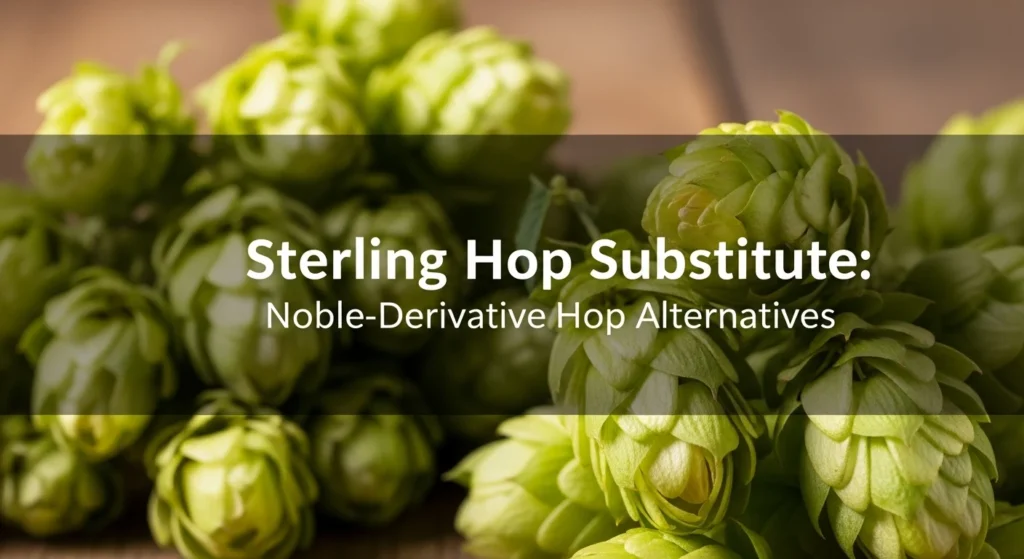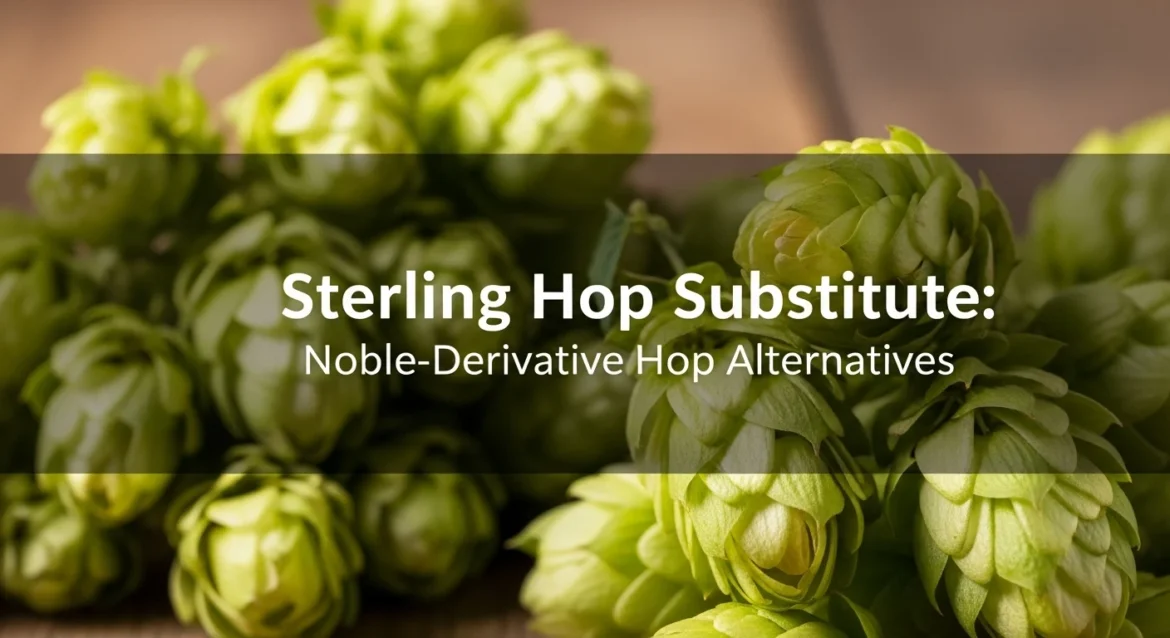Find the best Sterling hop substitutes with noble-derivative American character. Discover European and American alternatives for lagers, pilsners, and wheat beers.

Planning that crisp American lager with Sterling hops only to discover they’re sold out at your supplier? I’ve experienced that exact frustration more times than I care to admit in my brewing career. This versatile American noble-type hop has become increasingly popular for brewing craft beer thanks to its clean spicy-herbal-floral character derived from Saaz heritage, creating demand that occasionally exceeds availability at local suppliers. The good news? Several American and European hop varieties can replicate those distinctive spicy, herbal, and noble-like notes that make Sterling essential for refined lagers and pilsners.
Finding the right Sterling hop substitute requires understanding what makes this hop special beyond just being American-grown Saaz descendant. It’s about capturing that distinctive combination of refined spicy-herbal character, subtle floral notes, and clean noble-like complexity with moderate alpha acids that creates accessible refinement. After brewing with Sterling and testing various alternatives over the past decade, I’ve identified which substitutes actually deliver on their noble-derivative promises and which fall disappointingly short when clean, refined character matters.
This guide explores proven alternatives that maintain your beer’s intended flavor profile while respecting noble brewing traditions. Whether you’re brewing an American lager, pilsner, or wheat beer, you’ll find practical solutions that work.
Understanding Sterling’s Noble Heritage
Sterling emerged in 1998 from USDA breeding as cross of Saaz, Cascade, and Brewers Gold. This dual-purpose hop delivers spicy, herbal, floral, noble-like, and citrus characteristics with moderate alpha acids of 6-9%. What distinguishes Sterling from other American noble-type hops is its remarkably clean Saaz-derived character combined with slightly higher alpha acids and subtle American citrus backing that creates accessible noble complexity.
The hop’s development represented American breeding’s efforts to create domestic noble-type varieties combining European refinement with American growing advantages. Sterling’s moderate alpha acids provide better bittering efficiency than traditional European nobles while its refined spicy-herbal-floral aromatics maintain noble-like character.
When I first brewed with Sterling in an American pilsner seven years ago, the clean spicy-herbal aroma with subtle floral backing created exactly the refined American noble character I sought. That balanced, approachable quality is Sterling’s magic – noble enough to honor European traditions yet practical enough for American brewing with improved alpha efficiency.
Top Sterling Hop Substitute Options
Saaz: Noble Parent Heritage
Saaz stands as Sterling’s primary genetic parent, providing authentic Czech noble character. This legendary variety delivers earthy, herbal, spicy, mild, and noble characteristics with lower alpha acids of 3-4.5% that define traditional pilsner brewing.
Originating from the Žatec region of Bohemia, Saaz represents Sterling’s European noble heritage. While offering lower alpha acids and more pronounced earthy character, Saaz’s refined herbal-spicy profile shares genetic connection creating authentic noble alternatives when traditional Czech character matters.
When substituting Saaz for Sterling, use approximately 60-75% as much by weight depending on specific alpha acids. The beer’s character shifts toward traditional Czech earthy-herbal noble rather than American spicy-floral-citrus, creating authentic European profiles. Use Saaz when you want pure noble character from the Brewers Association standards.
Liberty: American Hallertau-Type
Liberty brings spicy, herbal, mild, floral, and noble-like characteristics with lower alpha acids of 3-5%. This American variety bred from Hallertau Mittelfrüh provides clean noble-like character with domestic growing advantages.
Released by USDA breeding in 1991 from Hallertau Mittelfrüh parentage, Liberty represents American noble-type breeding alongside Sterling. While offering lower alpha acids, Liberty’s clean spicy-herbal-floral profile creates alternatives when gentle noble-like refinement matters.
Use approximately 50-70% as much Liberty by weight when substituting for Sterling to compensate for lower alpha acids. The beer maintains noble-like spicy-herbal-floral character with cleaner American expression rather than Saaz-derived complexity, creating refined domestic profiles.
Mt. Hood: American Noble Versatility
Mt. Hood delivers spicy, herbal, floral, mild, and noble-like characteristics with moderate alpha acids of 5-8% that closely match Sterling’s range. This American variety bred from Hallertau provides versatile noble-like character.
Released by USDA breeding from Hallertau Mittelfrüh, Mt. Hood shares emphasis on refined noble-like character with practical alpha acids. The hop’s specific spicy-herbal-floral profile echoes Sterling’s complexity while offering slightly different emphasis.
When substituting Mt. Hood for Sterling, use approximately equal weights thanks to similar alpha acids. The beer maintains American noble-like spicy-herbal-floral character creating direct alternatives suitable for lagers, pilsners, and wheat beers.
Vanguard: American Hallertau Derivative
Vanguard offers spicy, herbal, floral, mild, and noble-like characteristics with moderate alpha acids of 5-6%. This American variety bred from Hallertau provides clean noble-like character with moderate bittering efficiency.
Released by USDA breeding, Vanguard shares American noble-type breeding goals. While offering moderately lower alpha acids than Sterling, Vanguard’s refined spicy-herbal-floral profile creates alternatives when noble-like character with moderate efficiency matters.
Use approximately 10-25% more Vanguard by weight when substituting for Sterling to compensate for slightly lower alpha acids. The beer maintains noble-like character with subtle American refinement creating accessible profiles.
Hallertau Mittelfrüh: German Noble Standard
Hallertau Mittelfrüh brings floral, spicy, herbal, mild, and noble characteristics with low alpha acids of 3-5.5%. This legendary German variety provides authentic noble character that influenced Sterling’s breeding.
Named after the Hallertau region of Bavaria, Mittelfrüh represents traditional German noble brewing. While lacking Sterling’s moderate alpha acids, Hallertau’s refined floral-spicy-herbal profile creates authentic European alternatives when traditional German noble character matters.
When substituting Hallertau Mittelfrüh for Sterling, use approximately 50-70% as much by weight to compensate for lower alpha acids. The beer’s character shifts toward traditional German floral-spicy rather than American spicy-herbal-citrus, creating classic European elegance.
Crystal: American Spicy-Floral
Crystal delivers spicy, floral, earthy, woody, and mild characteristics with low alpha acids of 3.5-5.5%. This American variety bred from Hallertau provides clean spicy-floral character.
Released by USDA breeding, Crystal represents American noble-type development. While offering lower alpha acids, Crystal’s spicy-floral-earthy profile creates alternatives when gentle American noble-like character matters.
Use approximately 50-65% as much Crystal by weight when substituting for Sterling to compensate for lower alpha acids. The beer maintains spicy-floral character with subtle earthy-woody notes creating mild American profiles.
Blending Strategies for Complete Substitution
The 60/40 American Noble Blend
My most successful Sterling replacement combines 60% Mt. Hood with 40% Liberty. This blend captures Mt. Hood’s versatile noble-like character while Liberty adds clean Hallertau-derived refinement approximating Sterling’s complete spicy-herbal-floral profile. The combination creates more layered American noble character than either hop alone.
Calculate your total hop bill first, then split according to this ratio for all additions. Use approximately equal total quantities to original Sterling amounts thanks to similar combined alpha acids while achieving balanced American noble-like character.
The European Noble Approach
For authentic noble character, blend 50% Saaz with 50% Hallertau Mittelfrüh. This combination emphasizes traditional Czech earthy-herbal from Saaz while Hallertau adds classic German floral-spicy creating layered European noble complexity.
Use reduced quantities (approximately 55-70% of original Sterling amounts) to compensate for lower combined alpha acids. The European character creates authentic alternatives when traditional noble refinement matters more than American practicality.
Single-Hop Simplicity
Sometimes simplicity wins. For straightforward beers where Sterling-like character matters most, Mt. Hood alone provides closest substitution at equivalent weights. The hop’s similar alpha acids and noble-like nature make it ideal when convenient American matching defines priorities.
For beers demanding pure noble character, Saaz by itself works at reduced quantities. The hop’s legendary status creates compelling alternatives when Czech authenticity matters more than alpha efficiency.
Beer Style Considerations
American Lagers and Pilsners
These clean styles showcase Sterling beautifully. Mt. Hood or Vanguard work exceptionally well as substitutes, providing American noble-like character that defines accessible refinement.
Use moderate hopping rates (1-1.75 oz per gallon total) with balanced bittering (25-38 IBUs) and gentle late additions. American lager brewing demonstrates that restraint with noble-type hops creates crisp drinkability.
German-Style Pilsners
Traditional pilsners showcase Saaz or Hallertau Mittelfrüh where authentic European noble character creates classic German or Czech profiles.
Use moderate hopping rates (0.75-1.5 oz per gallon total) with restrained bittering (28-40 IBUs) and traditional late additions. European pilsner brewing emphasizes noble hop purity where refined character defines the style.
Wheat Beers and Hefeweizens
Light wheat styles showcase Liberty or Crystal where gentle spicy-floral character complements wheat’s grainy sweetness and yeast-derived banana-clove esters.
Keep total hop rates low (0.5-1 oz per gallon) allowing wheat malt and yeast character to remain prominent. Traditional wheat beer brewing demonstrates that minimal noble hopping supports rather than dominates.
Here is the comparison chart:
Sterling Hop Substitute Comparison Chart – Alpha Acids, Flavors, and Beer Style Compatibility
Timing Your Hop Additions for Noble Character
Moderate Bittering (60 Minutes)
Sterling’s moderate alpha acids (6-9%) provide reasonable bittering efficiency for refined styles. Use Sterling substitutes moderately at 60 minutes to establish baseline bitterness.
I typically use 0.75-1.5 oz per gallon at 60 minutes with Sterling substitutes (adjusted for alpha acids) to establish baseline bitterness around 25-38 IBUs appropriate for lagers and pilsners. The moderate bittering creates clean foundations for noble character.
Flavor Additions (15-20 Minutes)
This window captures spicy-herbal-floral character beautifully. All Sterling substitutes excel here, releasing refined aromatics that integrate smoothly.
Add 0.5-1 oz per gallon at 15 minutes for traditional styles. This timing provides sufficient heat for extraction while preserving delicate noble aromatics.
Late Additions and Flameout
The final 5 minutes and flameout maximize spicy-herbal-floral character while controlling bitterness. This technique suits all Sterling substitutes by preserving noble refinement.
Use moderate quantities (0.25-0.75 oz per gallon) at flameout to add final aromatic layers. Traditional noble brewing emphasizes late additions where refined character develops during lagering.
Traditional Noble Dry Hopping
Traditional lagers rarely employ dry hopping, emphasizing kettle additions instead. When dry hopping lagers with Sterling substitutes, use very restrained quantities (0.1-0.25 oz per gallon) for 2-3 days maximum to maintain authentic character.
Excessive dry hopping creates grassy character inappropriate for refined noble brewing. Traditional kettle additions create more authentic profiles than modern dry hopping techniques.
Adjusting for Alpha Acids and Character
Understanding Sterling’s Moderate Profile
Sterling’s moderate alpha acids (6-9%) provide better bittering efficiency than traditional European nobles. Most substitutes have similar or lower alpha acids requiring quantity adjustments.
Use this formula: (Sterling AA% ÷ Substitute AA%) × Original Amount = Substitute Amount. For example: (7.5% ÷ 4% AA) × 1 oz = 1.88 oz of Saaz needed to replace 1 oz of Sterling for equivalent bitterness.
Oil Content and Noble Complexity
Sterling’s moderate oil content creates distinctive spicy-herbal-floral character with subtle citrus backing. Substitutes with different oil compositions emphasize different flavors – Saaz provides earthy-herbal Czech, Mt. Hood adds clean floral-spicy, and Liberty contributes gentle noble-like complexity.
Water Chemistry for Noble Expression
Soft Water for Pilsners
Traditional pilsner brewing utilizes soft water with low minerals. For authentic Sterling substitute character, target soft water profiles with sulfate and chloride both below 50 ppm.
Soft water allows delicate noble character to express without harsh mineral edges. This creates the refined elegance characteristic of traditional pilsner brewing.
Moderate Minerals for Lagers
For American lagers, moderately soft water with balanced minerals (sulfate and chloride both 50-100 ppm) creates clean foundations where noble-like hop character integrates smoothly.
Yeast Strain Synergies
Lager Yeast Excellence
For lagers and pilsners, clean lager yeasts (WLP830/W-34/70, WLP800) create crisp canvases where subtle noble-like hop character shines beautifully.
Ferment at proper lager temperatures (48-54°F) to create clean, crisp profiles. Extended lagering (4-6 weeks at 32-38°F) allows flavors to integrate and mellow into refined harmony.
Wheat Beer Yeast Complement
For wheat beers, German wheat yeasts (WLP300/WB-06) create complementary banana-clove esters that enhance rather than clash with noble-like hop spice.
Ferment at appropriate wheat beer temperatures (64-68°F) to encourage characteristic esters while allowing noble-type hop character to add subtle spicy backing.
Sourcing and Availability
Sterling Accessibility
Sterling enjoys good availability through American hop suppliers as domestic noble-type variety. When available, expect moderate pricing ($10-16 per pound) for American-grown hops.
The hop’s noble-like character with practical alpha acids maintains steady demand among brewers crafting refined American lagers and pilsners.
Substitute Availability
American noble-type substitutes (Mt. Hood, Liberty, Vanguard, Crystal) maintain excellent year-round availability through domestic suppliers at competitive prices ($10-16 per pound). European nobles (Saaz, Hallertau Mittelfrüh) stock moderately through specialty importers at premium pricing ($14-22 per pound) reflecting imported status.
Storage Best Practices
Store all hops in oxygen-barrier bags in your freezer at 0°F or below. Noble and noble-type hop aromatics maintain quality for 6-9 months frozen with gradual degradation affecting subtle spicy-herbal-floral character.
Common Substitution Mistakes
Using Bold American Hops
Substituting Sterling with aggressive American citrus hops completely misses refined noble-like character. Noble-type hop substitution requires varieties emphasizing spicy-herbal-floral rather than bold citrus-pine.
Wrong Alpha Acid Calculations
Failing to adjust quantities when using lower-alpha substitutes creates insufficient bitterness. Always calculate based on alpha acid ratios for accurate results.
Over-Hopping Noble Styles
Applying modern American hopping rates to refined noble-type styles creates inappropriate hop-forward character. Traditional noble brewing demonstrates that restraint creates elegance.
Frequently Asked Questions
What is the closest substitute for Sterling hops?
Mt. Hood provides closest overall match with similar moderate alpha acids (5-8%) and American noble-like spicy-herbal-floral character. Liberty offers American alternative with lower alpha acids (3-5%) requiring increased quantities (approximately 1.5× Sterling amounts). Blend 60% Mt. Hood with 40% Liberty for most complete noble-like substitution maintaining American character.
Can I use just one hop instead of Sterling?
Yes, single-hop substitutions work well in noble-type applications. Mt. Hood excels in American lagers and pilsners with convenient alpha acid matching. Saaz suits traditional pilsners emphasizing authentic Czech noble character. Liberty works in wheat beers and Belgian ales with gentle refinement. Choose based on desired authenticity and alpha acid requirements.
How much substitute hop should I use compared to Sterling?
For Mt. Hood (6.5% AA) replacing Sterling (7.5% AA), use approximately 1.15× the amount for equivalent bitterness. For Saaz (3.8% AA), use about 1.97× original amounts. For Liberty (4% AA), use roughly 1.88× Sterling quantities. Adjust based on specific alpha acid percentages using the formula provided.
Do these substitutes work in all beer styles?
Sterling substitutes adapt well across refined lager and noble-type styles. Mt. Hood, Liberty, and Vanguard suit American lagers, pilsners, and wheat beers. Saaz and Hallertau Mittelfrüh excel in traditional European pilsners. Crystal works in mild American ales. Avoid using noble-type hops in aggressive IPAs where refined character gets overwhelmed.
When should I add these hops during brewing?
Use moderate bittering additions (0.75-1.5 oz per gallon at 60 minutes, adjusted for alpha acids) establishing balanced bitterness (25-38 IBUs). Substantial flavor additions (0.5-1 oz per gallon at 15 minutes) add noble character. Moderate late additions (0.25-0.75 oz per gallon at flameout) maximize aromatics. Minimal or no dry hopping maintains authentic noble-type character.
Will my beer taste exactly the same with substitutes?
No substitute perfectly replicates Sterling’s exact spicy-herbal-floral combination with Saaz-derived American character, but well-chosen alternatives create equally refined noble-like profiles. Mt. Hood emphasizes clean spicy-herbal-floral, Saaz provides authentic Czech earthy-herbal, and Liberty adds gentle American noble-like complexity.
Where can I buy these substitute hops?
Major online suppliers like Yakima Valley Hops, Northern Brewer, and BSG Craft Brewing stock American noble-type varieties year-round with excellent availability. European nobles available through specialty importers with varying availability. All maintain competitive to moderate pricing with domestic varieties most accessible.
How should I store substitute hops?
Store all hops in oxygen-barrier packaging (vacuum-sealed mylar bags) in freezer at 0°F or below. Noble-type hop aromatics maintain quality for 6-9 months frozen with subtle spicy-herbal-floral notes fading faster than bold American citrus. Use freshest hops for late additions where noble character matters most.
Making Your Final Choice
Selecting the perfect Sterling hop substitute depends on your beer style, desired refinement, and hop availability. Mt. Hood offers closest practical matching for brewers seeking American noble-like character in lagers and pilsners where moderate alpha acids with clean spicy-herbal-floral defines the beer.
Saaz provides authentic European alternative for brewers prioritizing traditional Czech noble character in pilsners where earthy-herbal refinement matters more than alpha efficiency.
Liberty delivers gentle American option for brewers seeking clean noble-like character in wheat beers and Belgian ales where refined spicy-herbal-floral with domestic availability matters.
Remember that exceptional refined beer comes from respecting noble brewing traditions while adapting practically to ingredient availability. Sterling substitutions honor noble heritage while acknowledging American breeding’s practical improvements.
Don’t be afraid to blend American noble-type varieties for complete character, use Mt. Hood for convenient matching, or embrace European Saaz when authentic noble refinement matters most. The brewing community continues proving that thoughtful substitution creates elegant results.
Whether you’re crafting an American lager, traditional pilsner, or refined wheat beer, these Sterling substitutes will help you create exceptional beer that captures spicy-herbal-floral noble-like character. Trust proper calculations, brew with traditional restraint, and embrace the refined elegance that makes noble-type brewing so distinctive and rewarding.
About the Author
Lisa Fermenta is a certified nutritionist and fermentation expert who explores the health benefits of probiotic beverages. Her journey began in her grandmother’s kitchen, where she learned traditional fermentation techniques that have been passed down for generations. Lisa has studied with fermentation masters across Asia and Europe, bringing global perspectives to her brewing approach. She regularly conducts workshops on kombucha, kefir, and other fermented drinks, emphasizing both flavor development and health benefits. When not experimenting with fermented beverages, Lisa enjoys maintaining her SCOBY library containing over 30 unique cultures from around the world. Connect with her on Instagram for fermentation insights and probiotic beverage tips.

